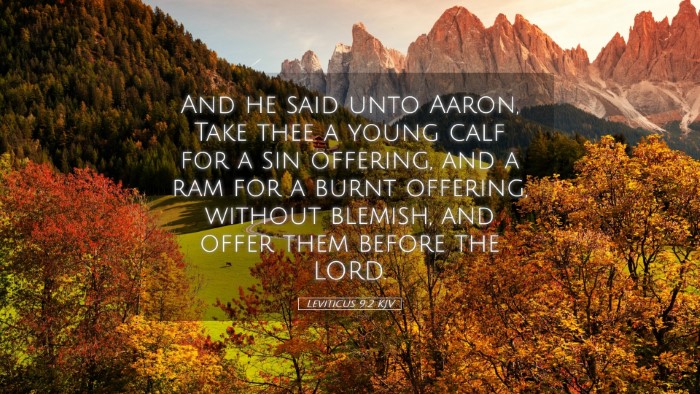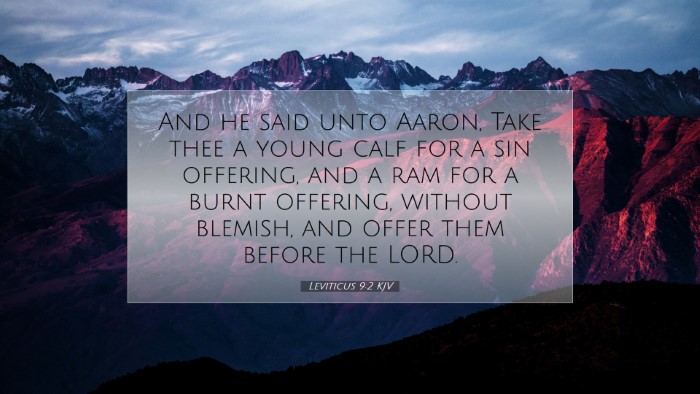Commentary on Leviticus 9:2
Leviticus 9:2 states: “And he said unto Aaron, Take thee a young calf for a sin offering, and a ram for a burnt offering, without blemish, and offer them before the LORD.”
Historical Context
This instruction comes at a pivotal moment in Israel's journey as they initiate their sacrificial system in the new tabernacle. Aaron, as the high priest, is presented with guidelines that emphasize the holiness and seriousness of approaching God.
Significance of Offerings
The sin offering and the burnt offering each serve distinct yet complementary purposes in the sacrificial system:
- Sin Offering: Represents the atonement for sins and the need for purification. It underscores the fallen state of humanity and our inherent need for God's mercy.
- Burnt Offering: Symbolizes complete dedication to God. This offering was wholly consumed by fire, demonstrating total surrender and commitment of the worshiper to divine will.
Commentary Insights
Public domain commentaries from notable theologians provide profound insights into Leviticus 9:2:
Matthew Henry's Commentary
Matthew Henry highlights the significance of Aaron's obedience to God's commands. He notes that the selection of a young calf and a ram illustrates not only the purity required for sacrifices but also God's desire for the best from His people. Henry contextualizes this within the framework of the priestly duties, emphasizing that Aaron’s role as the mediator between God and the people necessitates that he approaches God with proper offerings.
Albert Barnes' Notes on the Bible
Albert Barnes provides further elucidation on the phrase "without blemish." He outlines the necessity of flawlessness in offerings as a typology of Christ. According to Barnes, the stipulation for unblemished sacrifices serves as an early indication of the ultimate sacrificial Lamb, Jesus Christ, who would later atone for the sins of the world without spot or blemish. He elaborates that these offerings were meant to symbolize both the seriousness of sin and the access to God through the perfect sacrifice.
Adam Clarke's Commentary
Adam Clarke emphasizes that the offerings prescribed in this verse served not just to account for sin but to restore fellowship between God and His people. Clarke illustrates how the act of sacrifice was not merely ritual but a deeply spiritual act meant to evoke a sense of reverence and awe towards God. He also points out the preparatory nature of this offering, as it leads to the subsequent inauguration of the priesthood and the acceptance of the offerings by God, setting a precedent for worship in Israel.
Theological Implications
The contents of Leviticus 9:2 are steeped in theological significance that stretches beyond the mere act of sacrifice:
- Understanding Sin: This verse compels believers to contemplate the gravity of sin. It acknowledges humanity's constant need for atonement and reconciliation with God.
- Foreshadowing Christ: The requirements for the offerings give a prophetic glimpse into the nature of Christ's eventual sacrifice, emphasizing that only a perfect sacrifice can atone for sin.
- Priestly Role: The passage highlights the essential role of the priest as an intermediary, which is ultimately fulfilled in Christ, our High Priest, who mediates a new covenant.
Practical Applications
For pastors, students, theologians, and scholars, Leviticus 9:2 carries several practical lessons:
- Encouragement for Worship: This verse encourages us to approach God with reverence and sincerity, recognizing that worship requires preparation and intentionality.
- Living Sacrifices: Reflecting on the burnt offering, believers are reminded of their call to present themselves as living sacrifices, wholly dedicated to God's service (Romans 12:1).
- Holiness in Leadership: The responsibilities of spiritual leaders are highlighted, emphasizing the need for integrity and adherence to God's directives to lead others effectively.
Conclusion
In summary, Leviticus 9:2 serves as a foundational verse in understanding the sacrificial system, the seriousness of sin, and the nature of God as both holy and merciful. Insights from historical commentaries enrich our understanding and challenge our contemporary attitudes towards worship and holiness. As believers, we are called to recognize the gravity of our actions and to approach God with a heart of repentance, embodying the principles found in this ancient yet timeless text.


